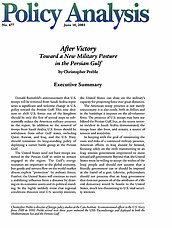The United States need not have troops stationed in the Persian Gulf in order to remain engaged in the region. The Gulf’s energy resources are important to the global economy, but goods and services flow on the world market absent explicit “protection” by military forces. Further, the United States will continue to exert a stabilizing influence from a distance by drawing on its economic assets and its political standing. In the highly unlikely event that regional conditions threaten vital U.S. security interests, the United States can draw on the military’s capacity for projecting force over great distances.
The American troop presence is not merely unnecessary; it is also costly, both in dollars and in the hardships it imposes on the all-volunteer force. The presence of U.S. troops may have stabilized the Persian Gulf, but, as the recent terrorist incident in Saudi Arabia demonstrated, the troops have also been, and remain, a source of tension and instability.
In keeping with the goal of minimizing the costs and risks of a continued military presence, American efforts in Iraq should be limited, focusing solely on the swift transitioning to an Iraqi interim government empowered to move toward self-government. Beyond that, the United States must be willing to accept the wishes of the Iraqi people and should not assume that a friendly government can or should be imposed at the barrel of a gun. Likewise, policymakers should not presume that an Iraqi government that does not possess all of the attributes of a liberal democracy would be hostile to the United States, much less threatening to U.S. vital security interests.


